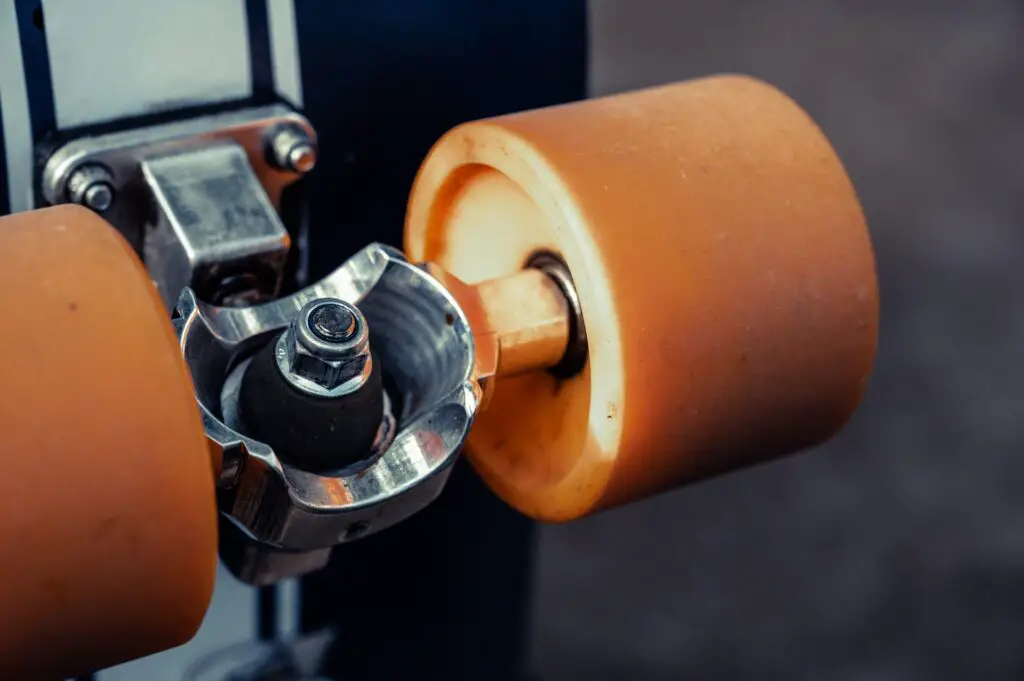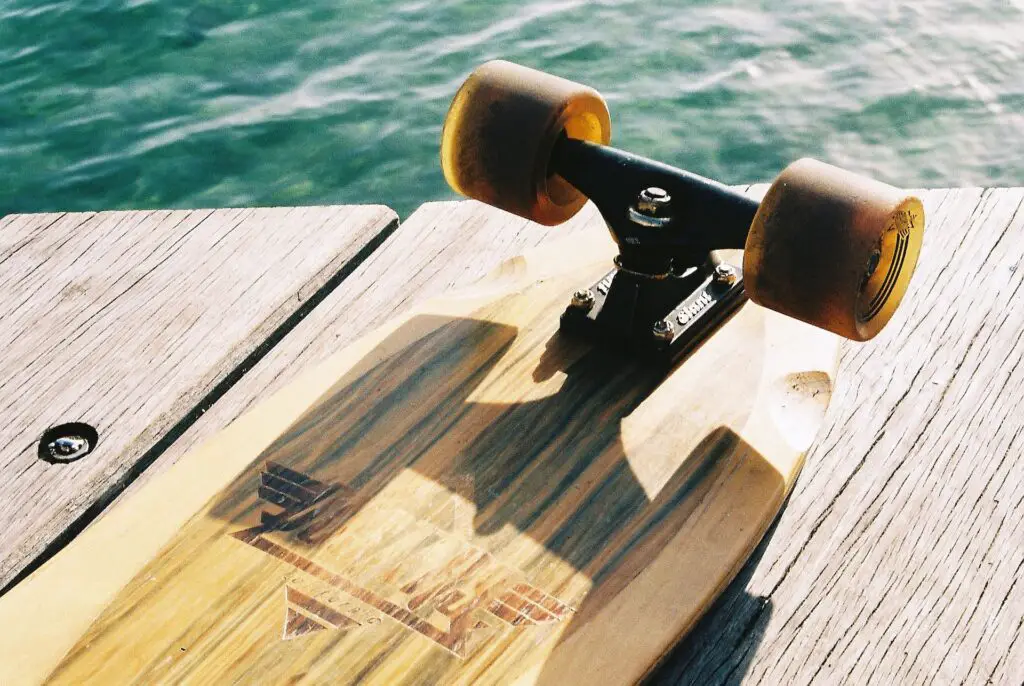
There are a few different materials that are used for skateboard wheels, but the best material is definitely urethane.
Urethane is a synthetic polymer that is durable and has a good grip on surfaces. It is also resistant to abrasions, which makes it ideal for skating.
Skateboard Wheels Made of Clay
Skateboard wheels made of Clay are a great material because it is very durable and provides a smooth ride. It is also very affordable, making it a great option for those on a budget.
Clay wheels are made by combining clay and rubber. The clay is used to provide durability, while the rubber provides grip and a smooth ride.
Clay wheels are typically made from a urethane/clay blend and offer a good grip and durability. Clay wheels are a good choice for beginners or those skating on rough surfaces.
PVC Wheel
PVC is another popular material for the best skateboard wheels. It is very durable and provides a ride in comfort It is also very affordable, making it a great option for those on a budget.
Rubber – Rubber wheels are another popular option. They are very durable and provide an enjoyable ride. However, they are not as fast as other materials.
Resin – Resin is another material used for skateboard wheels. It is very durable and provides a smooth ride. However, it is not as fast as other materials.
Urethane – Urethane is the most popular material for skateboard wheels. It is very durable and provides riding in style. It is also very fast, making it a great option for those who want to go fast.
Urethane Wheel
Urethane is the most popular material for skateboard wheels. It is very durable and provides a smooth ride. It is also very expensive, making it a great option for those who can afford it.
first Urethane wheels are made by combining urethane and rubber. The urethane is used to provide durability, while the rubber provides grip and a smooth ride.
Polyurethane Wheel (durometer & hardness)
Polyurethane is the best material for skateboard wheels on the market. It is durable and has a good grip on the ground, making it ideal for tricks and stunts.
Polyurethane is also lightweight, so it won’t slow you down when you’re skating.
Pros:
Designed for speed skating, these wheels offer great grip and smooth rolling. They’re also lightweight and strong.
Cons:
If you don’t have a fast skating street style, you may find that these wheels are too grippy for your needs.
Speed skating wheel size is important if you want to achieve top speeds on the rink. These wheels are designed to be used on a wide range of speed skating boots, so make it easier for skaters.
The smaller 42 mm size is best for beginners as it will offer more stability and control at slower speeds. The bigger 44 mm wheels offer less stability but can help you reach higher speeds on the rink.
Speed skating wheel hardness is measured in a durometer and is represented by a number followed by the letter “A”.
The higher the number, the harder the wheel. Hard wheels roll faster but aren’t as grippy as soft wheels. Softer wheels offer better grip but will slow you down on the rink.
For speed skating, I recommend using a hardest wheel of 84 A or 86 A. This will give you a good balance of speed and grip.
Which is the best material for skateboard wheels?
Different materials to make the wheels, each with its own advantages and disadvantages.
The three most common materials used for skateboard wheels are polyurethane (PU), polypropylene (PP), and polycarbonate (PC).
Polyurethane is the most popular material for skateboard wheels. It is durable and provides good grip and speed. However, PU wheels can be more expensive than different types of wheels.
Polypropylene is a cheaper alternative to PU, but it is not as durable. PP wheels also tend to be less grippy than PU wheels.
Polycarbonate is the strongest material used for skateboard wheels. PC wheels are less likely to break than PU or PP wheels, but they can be more expensive.
Skateboard wheel materials
Traditionally skateboard wheels are made from polyurethane, with varied hardness depending on the intended use of the skateboard.
Softer wheels are better for skating, while harder wheels are better for ramp and vert skating. The hardness of the wheel is measured on the Shore durometer scale.
Most skateboard wheels today are still made from polyurethane, although there is a growing trend towards urethane-coated wheels.
Urethane-coated wheels offer a smoother ride and more durability than traditional polyurethane wheels.
Pros and cons of each material
Skateboard wheels come in a variety of materials, each with its own set of pros and cons.
Urethane is the most common material for skateboard wheels. It is durable and has a good grip, making it ideal for street skateboarding.
However, urethane can be hard to control at high speeds and is not as smooth as some other materials.
Polyurethane (or PU) is another common material for skateboard wheels. PU is slightly more expensive than urethane, but it offers better performance in terms of speed and grip.
PU wheels are also easier to control than urethane wheels.
Rubber is another option for skateboard wheels. Rubber wheels are typically softer than urethane or PU wheels, which makes them better for absorbing impact when riding on rough surfaces.
However, rubber wheels are not as fast or as grippy as other options.
Which material is best for which skating style
There are three main materials used for skateboard wheels – polyurethane (PU), polypropylene (PP), and urethane. Each has its own unique properties that make it better suited for certain skating styles.
Polyurethane is the most common material used for skateboard wheels. It is durable and the wheel provides a good grip, making it ideal for streets and skateparks.
Polypropylene is a lighter-weight alternative to polyurethane. It is not as durable but can be faster and smoother riding. This makes it a good choice for downhill and longboarding.
Urethane is the least common material used for skateboard wheels but offers the best-performing tricks. Speed and smoothness are very good, but it isn’t as durable as the other two.
This makes the best ideal for racing or high-performance skating.
Are 99a wheels soft?
There is a lot of debate in the skateboarding community about what the best material is for different skateboard wheels.
There are three main materials that wheels are made from polyurethane (PU), polypropylene (PP), and polyethylene terephthalate (PET).
PU wheels are the most common type of wheel on the market, and they come in a variety of durometers, or hardness levels.
The durometer of a wheel is measured on the A scale, with 99a being the softest and 101a being the hardest. Some skaters prefer softer wheels because they offer more grip and are better for cruising and street skating.
Softer wheels also tend to wear down faster than harder wheels, so they will need to be replaced more often.
Harder wheels are better for speed and vert skateboarding, and they will last longer before needing to be replaced.
However, they can be more slippery on smooth riding surfaces and may not offer as much grip as softer wheels.
Ultimately, it comes down to your personal wheel performance and what type of skating you will be doing most often.
If you are just starting out, it might be a good idea to get a set of 99a wheels to see how you like them. You can always switch to harder or softer wheels later on if you find that you don’t like the way your 99a wheels perform.
Are 101A wheels too hard?
No definitive answer exists to this question since it depends on personal preferences.
However, many skateboarders find that 101A wheels are too hard, causing them to slide out more easily and making them more difficult to control.
Softer wheels (in the 80A-95A range) may provide better grip and be easier to control for some skaters.
Ultimately, it is up to each individual skater to experiment with different wheel durometers to find what works best for them.
How to choose the right skateboard wheels for you
When choosing skateboard wheels, the first thing to consider is what kind of skating you will be doing.
If you will be doing mainly street skating, then you will want to choose smaller wheels that are harder and have a higher durometer rating. This will give you more control when skating on rough surfaces and at high speeds.
If you will be doing mostly vert skating or skating in the skate park, then you may want to choose larger wheels that are softer and have a lower durometer rating.
This will give you more traction and a smoother ride on smooth surfaces.
The next thing to consider is the size of your skateboard deck. If you have a small deck, then you will want to choose smaller wheels so that they don’t stick out too much and throw off your balance.
If you have a large deck, then you can choose either smaller or larger wheels depending on your preference.
Finally, consider the bearings that come with the wheels. You want to make sure that the bearings are of good quality so that they don’t wear down quickly and cause your wheels to wobble.
Also, check to see if the bearings are pre-lubricated; if not, then you will need to lubricate them yourself before use.

How to avoid flat spots & wheel bites?
If you’re a skateboarder, then you know that flat spots and wheel bites are two of the worst things that can happen to your board.
Flat spots occur when your wheels stop spinning and start to controlled slide, while wheel bite happens when your wheels get caught on the lip of the deck and stop spinning.
Both of these problems can be avoided by using the right material for your skateboard wheels.
The best material for skateboard wheels is polyurethane, or PU. PU is a type of plastic that is both strong and flexible, which makes it ideal for skateboarding.
It’s also very flat spots resistant and wheel bite, so you can ride your board without fear of either of these problems occurring.
If you’re looking for the best possible performance from your skateboard, then you should look for wheels that are made from PU.
You’ll be able to ride with confidence, knowing that your wheels won’t flat spot or bite, no matter how hard you ride them.
Other Factors Affecting the Performance of Skateboard Wheels
There are several other factors that can affect the performance of skateboard wheels. These include the hardness of the wheel, the size and shape of the wheel, and the bearing quality.
The hardness of the wheel is measured on a durometer, with the higher numbers being harder.
Harder wheels will have more grip and be better for tricks that require a lot of sliding, such as grinds. Softer wheels will be faster and better for cruising and street skating.
The size of the wheel also affects performance. Smaller wheels are lighter and easier to control, but they don’t roll as fast. Larger wheels are faster but can be more difficult to control.
The shape of the wheel also plays a role in performance.
Wheels that are wider and have a round profile will grip better on rough surfaces, while thinner wheels with a sharp edge will slide more easily.
Bearing quality is also important for skateboard wheel performance. Bearings with higher ABEC ratings will spin faster and last longer, but they are also more expensive.
frequently asked questions(FAQ)
Are rubber or plastic wheels better for skateboards?
Both rubber and plastic wheels are popular options for skateboards. They are both durable and provide a smooth ride. However, rubber wheels are not as fast as plastic wheels.
Are Harder skateboard wheels better?
The debate of whether harder skateboard wheels are better has been going on for years. There are pros and cons to both sides of the argument.
Harder wheels will typically last longer, but they may not provide as much grip as softer wheels. Softer wheels will wear down quicker, but they may provide more grip and be more comfortable to ride.
Ultimately, it is up to the skater to decide what works best for them.
What is the best material for roller skate wheels?
Polyurethane (PU) is the best material for skateboard wheels. It is a synthetic material that is durable and has a high resistance to wear and tear. PU is also relatively light, which makes it ideal for skateboards.
Does The Shape Of Skateboard Wheels Matter?
The short answer is yes, the shape of skateboard wheels matters. The three most common wheel shapes are round, conical, and beveled. Each has its own unique riding characteristics.
Round wheels are the traditional choice for street and skateparks. They are also the best choice for beginners as they are easy to control and require less energy to maintain speed.
Conical wheels are more popular with experienced skaters that want to enjoy vert skating or street skating with lots of tricks. They provide a smoother ride and more speed.
Beveled wheels are designed for speed and are often used by racing skaters. The shape of your wheels will affect how your board rides and how easy it is to do tricks.
If you’re just starting out, round wheels are a good choice. They’re easy to control and won’t require as much energy to keep them moving.
If you’re looking to do tricks or skate on rougher surfaces, conical or beveled wheels might be a better option. They provide a smoother ride and can help you pick up speed more easily.
Conclusion
There is a lot of debate over what the best material for skateboard wheels is, but ultimately it comes down to personal preference.
Some people prefer the smoother ride of polyurethane wheels, while others like the grip and durability of urethane wheels.
Whatever your preference, make sure you do your research before buying skateboard wheels so that you can get the perfect set for your skating style.

